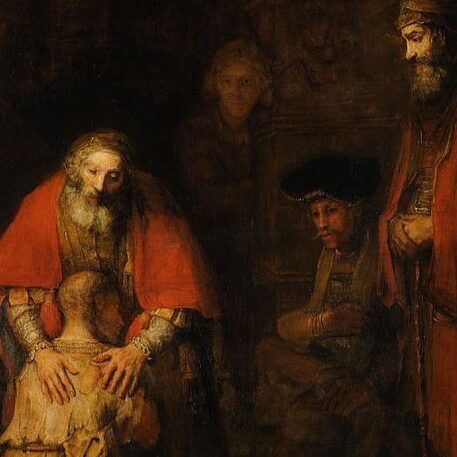
Forgive.
Because psychology is such a culturally bound field—so many of its purported truths prove specific to a particular era and location—it reveals only few precious trends that really transcend its immediate surroundings. Our immediate situation, of course, is plainly rife with social tensions big and small. And so we must wield these, the phenomenal few, carefully but boldly.
Forgiveness, it seems, is one of the few social phenomena worthy of such treatment. As a moral human principle, often a call to humble action, forgiveness is as old as time. And it spans religions in ways rare and profound. “Bear with each other and forgive one another if any of you has a grievance against someone,” goes the Pauline New Testament. “But if you pardon and overlook and forgive—then, indeed, Allah is forgiving and merciful,” reads the Quran. The Torah recounts the first earthly act of forgiveness told in the story of Joseph and his brothers. Forgiveness stretches back a long strand, an ethic, woven tightly into the fabric of recorded human history.
Psychologists merely stumbled upon it, as we do, with our studies and our clinics. In doing so, we learned to quantify it, assess its impact, and promote its utility as fundamental to human flourishing. And now the field can confidently claim what so many others knew all along: Across time and space, people and cultures, forgiveness is good for the mind and good for the body; go figure.
So forgiveness is now subject to robust psychological study, and it has even enjoyed trend status among the positive psychologists, virtue scientists, and even epidemiologists. And one of those researchers in at the ground floor, energizing the beginning momentums of these movements, is Dr. Everett L. Worthington Jr.
Dr. Worthington is professor emeritus in psychology at Virginia Commonwealth University. In part emboldened by his own personal trials—a murdered member of his family and another’s death by suicide—he has devoted a long and revered academic career to studying the effects of forgiveness on both the forgiven and the forgiver. That career has traversed the globe; he has held research posts at Harvard, Cambridge, and Hong Kong University. He has published popular and professional books, papers in countless peer-reviewed journals. And he has enjoyed features in periodicals and newspapers all across the country.
Last month, Dr. Worthington was generous enough to devote some of his time teaching The Center’s clinical staff about just a fraction of his life’s work. He prepared over 150 slides.
Here is a little about what we learned.
First, forgiveness, for all its nuances and social complications, is good for your health. Injustices warrant not forgetfulness or sly whitewash, and retaliation is different than reconciliation. But when one acknowledges wrongdoing or hurt and yet chooses to relinquish resentment, good things tend to happen. Capacities for forgiveness have been repeatedly associated with decreased stress and lower blood pressure, waning depressive symptoms, and even greater immune responses.
Second, the social scientists identify two types of forgiveness: Decisional Forgiveness and Emotional Forgiveness. Decisional Forgiveness is a cognitive and behavioral change in intentions. When one expresses Decisional Forgiveness, he or she makes the conscious choice to replace resentment or retaliation with acceptance and even warmth. Here it is important to note that one can offer this form of forgiveness while still harboring private hurts or fears. Thus, Emotional Forgiveness is a bit different. As its tag suggests, this kind of forgiveness requires a certain emotional transformation: Replacing unforgiving emotions with those more others-oriented like empathy, sympathy, or perhaps love. The latter, while perhaps more painfully won, seems to show more direct psychophysiological benefit to the forgiver. That is what the research says.
Third, forgiveness can be taught. While there are two most studied methods, I will focus on just one of them here. The REACH Model was developed by Dr. Worthington and his students at VCU over years of research and publication. That model proposes a sequence of forgiveness:
Recollection of the hurt or injustice
Empathy towards a designated aggressor
Altruistic offerings of forgiveness
Commitment to emotional forgiveness
Holding to that emotional forgiveness when doubts arise
And fourth, teaching forgiveness can be a productive mental health intervention in and of itself. The whole REACH Model, when it is taught, is buttressed by the decision and re-decision to forgive as interactions, near or distant, with a transgressor unfold. So, Dr. Worthington, and now so many others, have formulated individual and group intervention methods that serve to ameliorate psychological suffering with the help of habituated forgiveness. In fact, Dr. Worthington himself puts out (free of charge) empirically validated, self-directed workbooks for those pursuing it. And you can find them here.
Because forgiveness, a human virtue taught by so many historical religious and secular traditions, now unsurprisingly proves worthy as a so-called evidence-based psychological treatment, it serves as an integrative bridge between the theologies and the psychologies. And, you know, those are the bridges for which we at The Center keep a keen lookout. We share, here, the work of Dr. Everett Worthington Jr. hoping you might walk across that connective bridge too. Forgiveness, a shared term with resonant meaning, strengthens our shared bonds and lays forth a path towards resiliency amidst all the turmoil. May we bear it wisely and hopefully.
